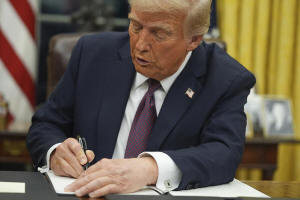22 states sue to stop Trump's order blocking birthright citizenship
 Send a link to a friend
Send a link to a friend
 [January 22, 2025]
By MIKE CATALINI [January 22, 2025]
By MIKE CATALINI
Attorneys general from 22 states sued Tuesday to block President Donald
Trump's move to end a century-old immigration practice known as
birthright citizenship guaranteeing that U.S.-born children are citizens
regardless of their parents’ status.
Trump's roughly 700-word executive order, issued late Monday, amounts to
a fulfillment of something he's talked about during the presidential
campaign. But whether it succeeds is far from certain amid what is
likely to be a lengthy legal battle over the president's immigration
policies and a constitutional right to citizenship.
The Democratic attorneys general and immigrant rights advocates say the
question of birthright citizenship is settled law and that while
presidents have broad authority, they are not kings.
“The president cannot, with a stroke of a pen, write the 14th Amendment
out of existence, period,” New Jersey Attorney General Matt Platkin
said.
The White House said it's ready to face the states in court and called
the lawsuits “nothing more than an extension of the Left's resistance."
“Radical Leftists can either choose to swim against the tide and reject
the overwhelming will of the people, or they can get on board and work
with President Trump," White House deputy press secretary Harrison
Fields said.

Connecticut Attorney General William Tong, a U.S. citizen by birthright
and the nation’s first Chinese American elected attorney general, said
the lawsuit was personal for him.
“The 14th Amendment says what it means, and it means what it says —- if
you are born on American soil, you are an American. Period. Full stop,”
he said.
“There is no legitimate legal debate on this question. But the fact that
Trump is dead wrong will not prevent him from inflicting serious harm
right now on American families like my own.”
What is birthright citizenship?
At issue in these cases is the right to citizenship granted to anyone
born in the U.S., regardless of their parents' immigration status.
People in the United States on a tourist or other visa or in the country
illegally can become the parents of a citizen if their child is born
here.
It's enshrined in the 14th Amendment to the Constitution, supporters
say. But Trump and allies dispute the reading of the amendment and say
there need to be tougher standards on becoming a citizen.
The U.S. is among about 30 countries where birthright citizenship — the
principle of jus soli or “right of the soil” — is applied. Most are in
the Americas, and Canada and Mexico are among them. Most other countries
confer citizenship based on whether at least one parent — jus sanguinis,
or “right of blood” — is a citizen, or have a modified form of
birthright citizenship that may restrict automatic citizenship to
children of parents who are on their territory legally.
What does Trump's order say?
Trump's order questions that the 14th Amendment extends citizenship
automatically to anyone born in the United States.
Ratified in 1868 in in the aftermath of the Civil War, the 14th
Amendment says: “All persons born or naturalized in the United States
and subject to the jurisdiction thereof, are citizens of the United
States and of the State wherein they reside.”

Trump's order asserts that the children of noncitizens are not subject
to the jurisdiction of the United States. It excludes the following
people from automatic citizenship: those whose mothers were not legally
in the United States and whose fathers were not U.S. citizens or lawful
permanent residents, and people whose mothers were in the country
legally but on a temporary basis and whose fathers were not citizens or
legal permanent residents.
It goes on to bar federal agencies from recognizing the citizenship of
people in those categories. It takes effect 30 days from Tuesday, on
Feb. 19.
[to top of second column]
|

President Donald Trump signs an executive order on birthright
citizenship in the Oval Office of the White House, Monday, Jan. 20,
2025, in Washington. (AP Photo/Evan Vucci)

It's not clear whether the order would retroactively affect
birthright citizens. It says that federal agencies “shall” not issue
citizenship documents to the people it excludes or accept other
documents from states or local governments.
What is the history of the issue?
The 14th Amendment did not always guarantee birthright citizenship
to all U.S.-born people. Congress did not authorize citizenship for
all Native Americans born in the United States until 1924.
In 1898 an important birthright citizenship case unfolded in the
U.S. Supreme Court. The court held that Wong Kim Ark, who was born
in San Francisco to Chinese immigrants, was a U.S. citizen because
he was born in the country. After a trip abroad, he had faced denied
reentry by the federal government on the grounds that he wasn't a
citizen under the Chinese Exclusion Act.
But some advocates of immigration restrictions have argued that
while the case clearly applied to children born to parents who are
both legal immigrants, it’s less clear whether it applies to
children born to parents without legal status.
The issue of birthright citizenship arose in Arizona — one of the
states suing to block Trump's order — during 2011 when Republican
lawmakers considered a bill that would have challenged automatic
birthright citizenship. Supporters said then that the goal wasn’t to
get every state in the nation to enact such a law, but rather to
bring the dispute to the courts. The bill never made it out of the
Legislature.
What has the reaction to Trump's order been?
In addition to the states, the District of Columbia and San
Francisco, immigrant rights groups are also suing to stop Trump's
order.

Chapters of the American Civil Liberties Union in New Hampshire,
Maine and Massachusetts along with other immigrant rights advocates
filed a suit in New Hampshire federal court.
The suit asks the court to find the order to be unconstitutional. It
highlights the case of a woman identified as “Carmen,” who is
pregnant but is not a citizen. The lawsuit says she has lived in the
United States for more than 15 years and has a pending visa
application that could lead to permanent status. She has no other
immigration status, and the father of her expected child has no
immigration status either, the suit says.
“Stripping children of the ‘priceless treasure’ of citizenship is a
grave injury,” the suit says. “It denies them the full membership in
U.S. society to which they are entitled.”
In addition to New Jersey and the two cities, California,
Massachusetts, Colorado, Connecticut, Delaware, Hawaii, Maine,
Maryland, Michigan, Minnesota, Nevada, New Mexico, New York, North
Carolina, Rhode Island, Vermont, and Wisconsin joined the lawsuit to
stop the order.
Arizona, Illinois, Oregon and Washington filed a separate suit in
federal court challenging Trump's order as well.
___
Associated Press reporter Jacques Billeaud in Phoenix, David Collins
in Hartford, Connecticut, Zeke Miller, Rebecca Santana and Mark
Sherman in Washington, contributed to this report.
All contents © copyright 2025 Associated Press. All rights reserved
 |